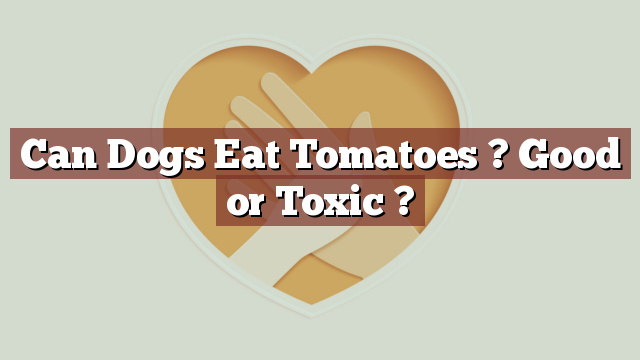Can Dogs Eat Tomatoes? Good or Toxic?
Knowing which foods are safe for our furry friends is crucial in ensuring their overall health and well-being. One common question that arises is whether dogs can safely consume tomatoes. In this article, we will explore the nutritional value of tomatoes for dogs, determine if they are safe for dogs to eat, discuss potential risks and benefits, and provide guidance on what to do if your dog eats tomatoes.
Nutritional Value of Tomatoes for Dogs
Tomatoes are widely known for their rich nutritional composition. They are a great source of vitamins A, C, and K, as well as potassium and dietary fiber. These vitamins and minerals are essential for maintaining a healthy immune system, promoting proper digestion, and supporting overall growth and development in dogs. Additionally, tomatoes contain antioxidants, such as lycopene, which have been linked to various health benefits in humans.
Are Tomatoes Safe for Dogs to Eat?
Yes, dogs can eat tomatoes, but with some important considerations. While tomatoes are generally safe for dogs, certain parts of the tomato plant, such as the leaves and stems, contain a substance called solanine, which can be toxic to dogs in large quantities. The solanine levels in ripe tomatoes are typically low and not harmful to dogs. However, unripe tomatoes and the green parts of the plant should be avoided.
Furthermore, it is crucial to remove the tomato seeds and stems before feeding them to your dog. These parts can be a choking hazard and may cause digestive issues. Additionally, some dogs may experience mild gastrointestinal upset after consuming tomatoes, so it is important to introduce this food gradually and monitor your dog for any adverse reactions.
Potential Risks and Benefits of Dogs Eating Tomatoes
When fed in moderation, tomatoes can provide several health benefits to dogs. The vitamins and minerals present in tomatoes can support their overall health and boost their immune system. The antioxidants, such as lycopene, may also contribute to reducing the risk of certain diseases in dogs, just as they do in humans.
However, it is essential to be aware of the potential risks associated with feeding tomatoes to dogs. As mentioned earlier, the green parts of the plant and unripe tomatoes can contain solanine, which is toxic to dogs. Ingesting large quantities of solanine can lead to symptoms such as gastrointestinal upset, weakness, and even neurological issues. Therefore, it is crucial to only feed your dog ripe tomatoes in moderation and avoid any green parts of the plant.
What to Do If Your Dog Eats Tomatoes
If your dog accidentally consumes tomatoes, there are a few steps you can take to ensure their safety. First, assess the situation and determine the quantity and parts of the tomato your dog has ingested. If your dog has eaten a small amount of ripe tomato, there is usually no cause for concern. However, if your dog has ingested a large quantity or any green parts of the plant, it is advisable to contact your veterinarian for guidance.
In cases where your dog experiences symptoms of gastrointestinal upset, such as vomiting or diarrhea, it is crucial to monitor them closely. Ensure they have access to fresh water and consider feeding them a bland diet to help settle their stomach. If the symptoms persist or worsen, seek veterinary advice promptly.
Conclusion: Can Dogs Eat Tomatoes?
In conclusion, dogs can eat tomatoes as long as certain precautions are taken. Ripe tomatoes, with their low solanine levels, are generally safe for dogs to consume. However, it is important to remove the seeds and stems, as well as avoid any unripe tomatoes or green parts of the plant. If you are unsure or concerned about feeding tomatoes to your dog, it is always best to consult with your veterinarian. Remember, the key to a healthy and happy dog is a balanced and appropriate diet.
Thank you for investing your time in exploring [page_title] on Can-Eat.org. Our goal is to provide readers like you with thorough and reliable information about various dietary topics. Each article, including [page_title], stems from diligent research and a passion for understanding the nuances of our food choices. We believe that knowledge is a vital step towards making informed and healthy decisions. However, while "[page_title]" sheds light on its specific topic, it's crucial to remember that everyone's body reacts differently to foods and dietary changes. What might be beneficial for one person could have different effects on another. Before you consider integrating suggestions or insights from "[page_title]" into your diet, it's always wise to consult with a nutritionist or healthcare professional. Their specialized knowledge ensures that you're making choices best suited to your individual health needs. As you navigate [page_title], be mindful of potential allergies, intolerances, or unique dietary requirements you may have. No singular article can capture the vast diversity of human health, and individualized guidance is invaluable. The content provided in [page_title] serves as a general guide. It is not, by any means, a substitute for personalized medical or nutritional advice. Your health should always be the top priority, and professional guidance is the best path forward. In your journey towards a balanced and nutritious lifestyle, we hope that [page_title] serves as a helpful stepping stone. Remember, informed decisions lead to healthier outcomes. Thank you for trusting Can-Eat.org. Continue exploring, learning, and prioritizing your health. Cheers to a well-informed and healthier future!

